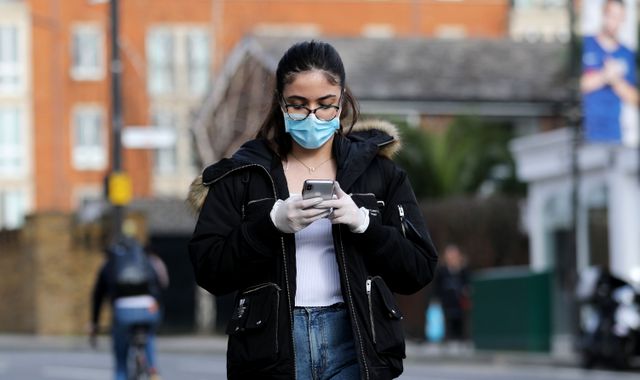Coronavirus: World Health Organisation to review whether masks help prevent COVID-19 spread
Written by News on 02/04/2020
A virus expert has told Sky News it is “suspicious” that countries where mask-wearing is commonplace have got coronavirus “under control”.


Professor Peter Openshaw, who researches viral lung diseases at Imperial College London, suggested there is still a debate about whether wearing masks is effective in the battle against coronavirus.
The World Health Organisation (WHO) currently advises people to only wear masks if they are ill with COVID-19 symptoms or caring for someone who may be infected.
They warn that wearing a mask if you are not ill or looking after someone who is ill is a waste of a mask, at a time when there is a worldwide shortage.
If masks become moist, then virus particles can pass through and they become an ideal environment for bugs to breed in.
However, the WHO is debating with worldwide experts on Thursday whether there is evidence to support a change in its stance on masks.
Japanese Prime Minister Shinzo Abe has offered two masks to each of the more than 50 million households in his country, as he warned Japan is “barely holding the line” in its battle against coronavirus.
However, Mr Abe was criticised by some who branded his action a waste of money.
Prof Openshaw told Sky News’ Kay Burley @ Breakfast show he could “appreciate” the expert advice that – without fitting masks properly – they don’t really work and there is a risk of contamination as people take masks on and off.
“I’ve listened carefully to the evidence on masks, I’ve read the papers, I’ve talked to the people who are real mask experts – I’m not a mask expert,” he said.
“And I can appreciate what they mean when they say that the way we use masks is normally not very effective.”
However, Prof Openshaw added: “If you look at the graphs of the way that the epidemic has gone in different countries, you can see that it’s the countries that have a lot of mask-wearing that have really got it under control.
“So I think that’s suspicious.
“We don’t know whether the dose of virus that you are infected with makes a difference to the severity of the disease.
“But I think we could all assume that if you’re wearing a mask, you’re at least less likely to be putting your finger up your nose and in your mouth inadvertently after you might have contaminated it – even if the mask isn’t well fitting.
“But, on the other hand, there’s no point recommending something if there are no more masks readily available.”
Professor Matthew Freeman, from the Sir William Dunn School of Pathology at Oxford University, also told Sky News that he thought “masks are part of a solution”.
“They do not make you invincible, I think one of the worries is that if people put on masks they think ‘I am now invincible, I can go back out and mix with people’,” he said.
“That’s clearly not right. But masks definitely provide a level of protection and I’ve been very interested to see in some countries recently they’ve been beginning to mandate the wearing of masks, whereas masks have not been part of the solution in this country so far.”
Prof Freeman added he would “probably” wear a mask – if he had one – the next time he went to the supermarket.
On Wednesday, infectious disease expert Professor David Heymann revealed the WHO was to review evidence on mask-wearing.
He told a Chatham House briefing: “There is right now a debate about the usefulness of masks because Hong Kong has provided some evidence that masks may be useful in protecting individuals from infection.
“It’s not clear yet whether or not that’s true.
“WHO, the group that I work with, is debating that with a group of experts around the world… to understand whether there is evidence which would call for a change in what WHO is recommending now for masks – which is that they really don’t have a major role in protecting people from infection except in healthcare workers where they also wear eye protection and they also have a role from protecting others from coughs or sneezing.”
He added: “But as the evidence becomes available, it seems there will be a debate trying to decide whether masks play a role at some point in the outbreak.
“And believe me, if they do, there is a private sector healthy enough to begin producing those masks in quantities necessary.”
The WHO panel will reportedly discuss a study in the US that suggests coughs can reach six metres and sneezes up to eight metres.
In the UK, current advice on social distancing is to remain two metres away from others.
(c) Sky News 2020: Coronavirus: World Health Organisation to review whether masks help prevent COVID-19 spread







